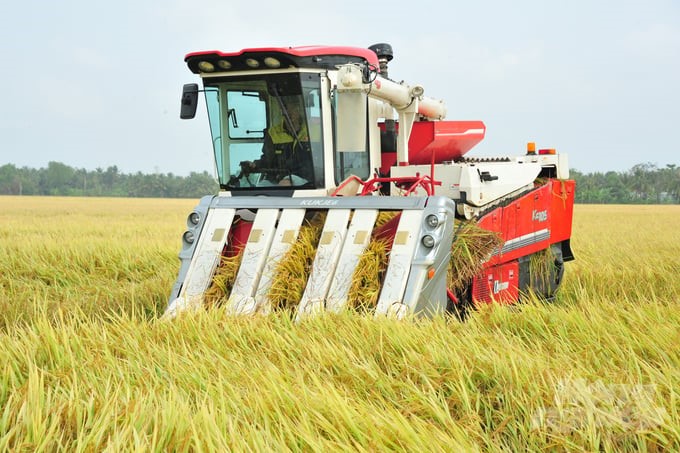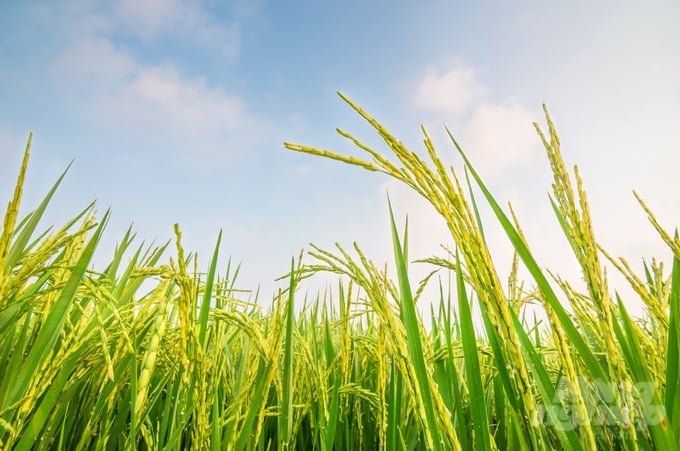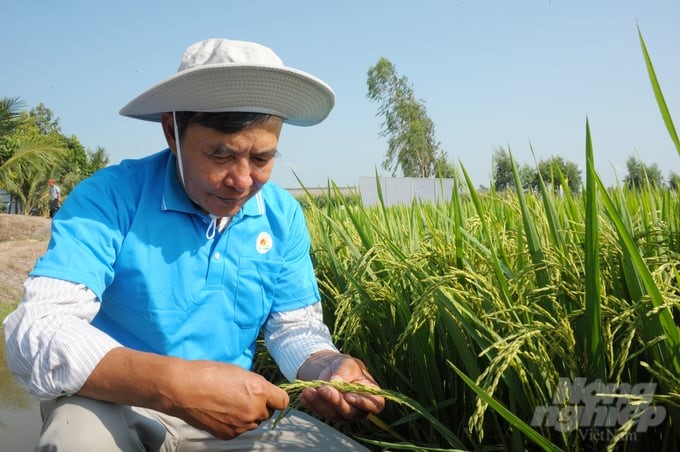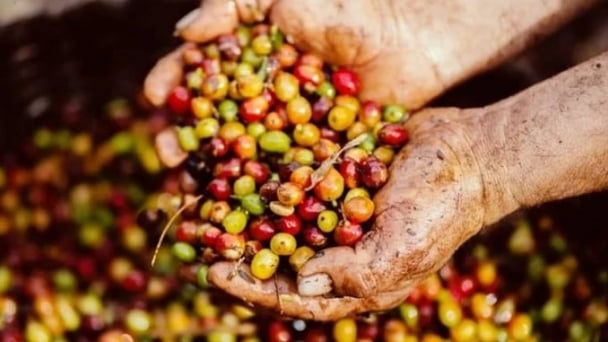June 18, 2025 | 03:34 GMT +7
June 18, 2025 | 03:34 GMT +7
Hotline: 0913.378.918
June 18, 2025 | 03:34 GMT +7
Hotline: 0913.378.918
An Giang Department of Agriculture and Rural Development, in collaboration with the Netherlands Development Organization (SNV) in Vietnam, recently organized a workshop "Transforming Rice Value Chains for Climate Resilient and Sustainable Development in the Mekong Delta" (referred to as the TRVC Project) for businesses and cooperatives in the rice value chain of An Giang province. Accordingly, the TRVC Project will support An Giang with about VND 22 billion to develop the local rice value chain.

The TRVC Project will create favorable conditions for An Giang to implement the Project of 1 Million Hectares of High-Quality Rice. Photo: Le Hoang Vu.
Mr. Ton That Thinh, Deputy Director of the An Giang Department of Agriculture and Rural Development, said that rice is one of the province's key industries. An Giang has a rice farming area of about 640,000 hectares/year, yielding about 4.1 million tons/year, of which high-quality rice varieties account for approximately 85%. To concretize the goal of sustainable development until 2030, An Giang province has registered with the Ministry of Agriculture and Rural Development to participate in the Project "Sustainable Development of 1 Million Hectares Specializing in High-Quality and Low-Emission Rice Cultivation Associated with Green Growth in the Mekong Delta," with the whole province's area specializing in high-quality rice cultivation reaching 40,000 hectares by 2025 and 150,000 hectares by 2030.
Currently, An Giang has an area participating in rice consumption linkages with businesses in the province of about 30,000–35,000 hectares/crop; however, in recent times, the impact of climate change and greenhouse gas emissions (irrigation water, weather, farming practices) has affected agricultural production.
Over the years, rice productivity has increased almost insignificantly (at the ceiling level). Therefore, to help farmers produce effectively, stably, and sustainably, An Giang's agriculture sector is paying attention to supporting investors to implement investment projects in the agricultural and rural fields in the province and promoting production and consumption linkage chains for agricultural products.

The TRVC Project will support An Giang with about VND 22 billion to develop the rice value chain. Photo: Le Hoang Vu.
This orientation as well as the opportunity of An Giang being one of three provinces (An Giang, Dong Thap, and Kien Giang) chosen by the Netherlands Development Organization (SNV) to implement the project will be a favorable condition to promote the transformation to rice farming methods with climate resilience and low carbon emissions through the development of sustainable value chains, while also improving the livelihoods of rice farming households.
"The TRVC project implemented in An Giang will open a new direction for rice production in the province, bringing great brand values, creating rice product lines produced in the way of environmental responsibility and reducing greenhouse gas emissions, and laying a solid foundation for businesses willing to participate. The implemented project will promptly support and create more favorable conditions for the province to participate in the Project 'Sustainable Development of 1 Million Hectares Specializing in High-Quality and Low-Emission Rice Cultivation Associated with Green Growth in the Mekong Delta until 2030'," expected Mr. Ton That Thinh, Deputy Director of the An Giang Department of Agriculture and Rural Development.

An Giang calls on businesses to participate in the TRVC Project. Photo: Le Hoang Vu.
Ms. Tran Thu Ha, SNV Project Director, said that the Project will support 10 businesses linking with cooperatives and farmers in the provinces of An Giang, Dong Thap, and Kien Giang to convert to low-emission rice production on an area of 200,000 hectares by 2027, with about 200,000 farmer households benefiting. This will contribute to realizing the ambition of reaching 1 million hectares of high-quality, low-emission rice in the Mekong Delta, according to the project of the Ministry of Agriculture and Rural Development.
In addition, the Project also has cash rewards worth VND 57 billion for farmers who participate and achieve greenhouse gas emission reduction goals by 2027, with emissions inspected by independent inspection agencies.
The Project "Transforming Rice Value Chains for Climate Resilient and Sustainable Development in the Mekong Delta" is sponsored by the Australian Embassy in Vietnam and the Netherlands Development Organization in coordination with the Ministry of Agriculture and Rural Development and the Department of Agriculture and Rural Development of An Giang, Dong Thap, and Kien Giang provinces in the 2023–2027 period. The Project will start to be implemented in the summer-autumn rice crop of 2024.
Translated by Thu Huyen
![Turning wind and rain into action: [7] Early disaster warnings help marine farmers minimize losses](https://t.ex-cdn.com/nongnghiepmoitruong.vn/608w/files/news/2025/06/17/z6704423696987_15fd32ffc26d590d204d520c9dac6786-nongnghiep-142942.jpg)
(VAN) In recent years, thanks to early disaster warnings and forecasting, marine farmers in Khanh Hoa province have been able to reduce risks and losses, thereby improving production efficiency.
![Turning wind and rain into action: [6] ‘Four on-the-spot’ disaster management software](https://t.ex-cdn.com/nongnghiepmoitruong.vn/608w/files/news/2025/06/17/e5a48259d6a262fc3bb3-nongnghiep-183800.jpg)
(VAN) By simply activating the scenario on the disaster management software, the relevant authorities immediately know how many households need to be evacuated, where to evacuate them to, and by what means of transportation…
![Turning wind and rain into action: [5] Hue applies modern technology in disaster forecasting](https://t.ex-cdn.com/nongnghiepmoitruong.vn/608w/files/news/2025/06/17/z6704423696987_15fd32ffc26d590d204d520c9dac6786-nongnghiep-093938.jpg)
(VAN) In Hue city, modern technology has recently been applied in meteorological and hydrological forecasting and warning, helping to reduce the damage caused by natural disasters.

(VAN) A cutting-edge farming technique being implemented on an experimental ranch in Arizona's Sonoran Desert has already saved a billion gallons of water over five years, according to Civil Eats.

(VAN) Poultry and pig production and the environment can be boosted through enhanced water technology, according to new research.

(VAN) Coffee prices on June 16, 2025 are unchanged. In Vietnam, local trading prices are holding steady, ranging around VND 112,000 – VND 112,500/kg.
![Turning wind and rain into action: [4] Bringing climate bulletins to remote and isolated areas](https://t.ex-cdn.com/nongnghiepmoitruong.vn/608w/files/linhnhp/2025/06/14/1152-z6704423696987_15fd32ffc26d590d204d520c9dac6786-nongnghiep-151141.jpg)
(VAN) The Vietnam Agriculture and Nature Newspaper interviewed Mr. Vu Thai Truong, Acting Head of Climate Change and Environment at UNDP Vietnam, to gain deeper insight into how climate bulletins are delivered to farmers.